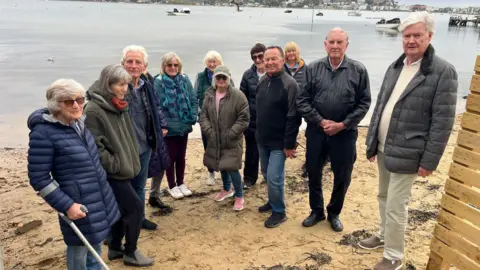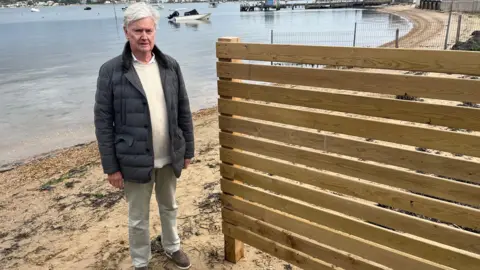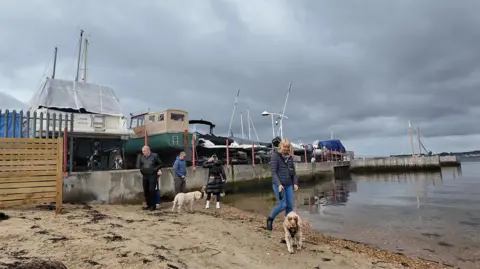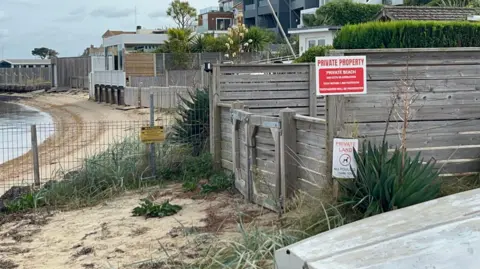Curtis LancasterSouth of England, Sandbanks

 BBC
BBC
A group of Sandbanks residents are unhappy with the erecting of a fence on a local beach
"We're being denied something that should be free to us," is the feeling among some local residents of a seaside town that is divided over a section of beach.
Resorts like Sandbanks in Poole often lay dormant in the winter months, silently waiting for summer tourist crowds to descend once again.
But after a fence went up on a beach, a row erupted between residents who enjoy the area all year round.
Some locals claim their right to roam has been restricted and others say they own the land and can use it however they like.
As a regular beachgoer I went down to hear both sides of the argument that has split a community.


Norman Allenby-Smith is the chairman of the Sandbanks Community Group
'Nobody owns the sand'
Sandbanks holds a special place in my heart, as the spot where I first met and proposed to my now wife.
And as I stroll along the promenade on a chilly autumn morning I'm aware of the dozens of other people also meandering in their own world, each with their own special link to this place.
This is why the erecting of a wooden fence on a stretch of beach earlier this year, has caused passions to run high.
"Nobody owns the sand, the sand is a natural public right of way," says Suzanne McGowan who has lived in Sandbanks since 1992 and has walked her dogs in the area daily.
"The boy I've got with me today first come down when he was 12 weeks old and he is now 12 and a half years old," she says as she looks down at her black labrador.
We walk down Footpath No. 82, a stone's throw from the main beach, flanked by a yacht club on one side and housing on the other.
It runs from Panorama Road down to the edge of Poole Harbour and locals have used it to access the beach and foreshore for decades.
Luxury homes are fortunate enough to have rear gardens that lead right down to the sand where the fence has been put up.
Now there is also a sign warning people to stay within a 1.8m-wide path on the beach, adding: "Trespassers will be prosecuted."
Ms McGowan said she was recently told to leave the area when her dog ventured beyond the fence, onto land which homeowners say belongs to them.
She said she had not been able to return to the site since as she felt it was "very intimidating".


Suzanne McGowan and Fanny Thomas say they have been warned off the land
Fanny Thomas, who is about to turn 80, says she has been walking in the area for her whole life.
She said when she recently walked her dog on the beach late at night a security light came on, a CCTV camera was filming her and a voice echoed from a nearby speaker telling her to "go away".
Sue Draper, has lived in the area since the 1980s and is "angry" with the situation.
"Why should we have our beach fenced off?" she asked.
Adding that residents have "used it for all these years and nobody was bothered".
She explained that when people follow the public footpath they are now forced to congregate on one small patch of sand because there was "nowhere to go".
Lesley Barratt, has walked there since 2002, and said the quiet area is ideal for dog walking when the main beach is busy.
"We don't sit around there we go along and then come back again," she said.


Residents say dog walkers are forced to congregate in a small area
Sandbanks tops the list as Britain's most expensive seaside location with an average house price of £965,708 in the area last year.
On The Horseshoe, which is the road that backs onto the beach at the centre of the row, I am greeted by the front gates of those homes whose gardens lead to the sand.
After trying each of the buzzers on the road I was unable to find the owner of the fence, however Nick Sawyer, a resident on the road did answer his intercom and shared his views.
"It is not a beach as they keep saying, it's actually a foreshore and it's privately owned," he said.
He added: "It's all gotten really out of hand and ridiculous."
Mr Sawyer told me he does not mind people walking along the beach as long as they were "courteous and respectful".
"I'm not trying to fight anybody here, I'm just trying to find an amicable solution," he said.


A wire fence has been put up further down the beach with private property attached
Norman Allenby-Smith, the chairman of the 650-member Sandbanks Community Group says he has also been trying to find a civilized solution but has so far "failed".
He said the intimidation of local residents is what forced his group into action.
"We felt we had to do something about it, before then it was friendly and people didn't mind but now unfortunately it's brought it to a head," he said.
The group are now seeking legal advice, as they fear the impact that leaving something like this could have.
"It all sets a precedent and there are other areas that could have the same sort of problem if they are not careful," he said.
"We've got to watch the protection of the public realm all around the peninsula."
Who owns the shoreline?
The Crown Estate (TCE) manages around half of the foreshore around England, Wales and Northern Ireland, which is the land between mean high and mean low water mark.
It said: "The land in question isn't under TCE ownership and appears to be privately owned."
A spokesperson for Bournemouth, Christchurch and Poole Council, said: "As the land is in ownership, there is no planning application required for the fence.
"In terms of the beach, I've been informed it is a private beach by the relevant officer and have nothing further to suggest public access is possible."
Lewis Winks, a campaigner with the national group Right to Roam is appealing for new legislation to protect public access to the countryside.
He said ownership can be "complex" and the group wants people to have access to places where they have historically been able to roam like the foreshore "regardless of the ownership there".
"I think one of the issues that's being encountered is because the ownership structures are so complex and because we don't have robust statutory rights of access that we end up with these situations where people literally overnight can lose really cherished access," he said.
.png)
 1 month ago
13
1 month ago
13








 English (US) ·
English (US) ·